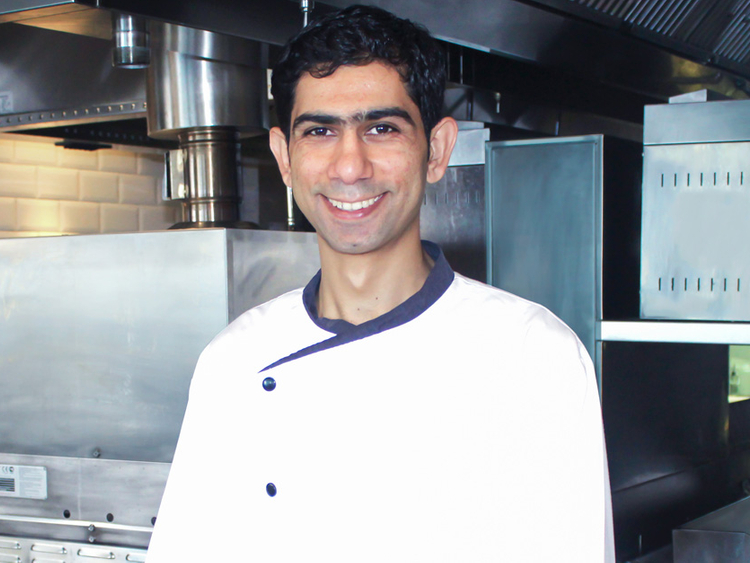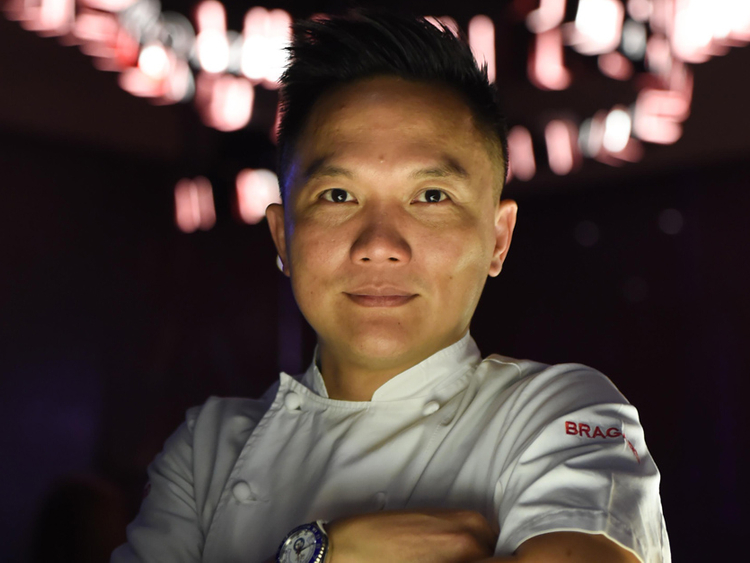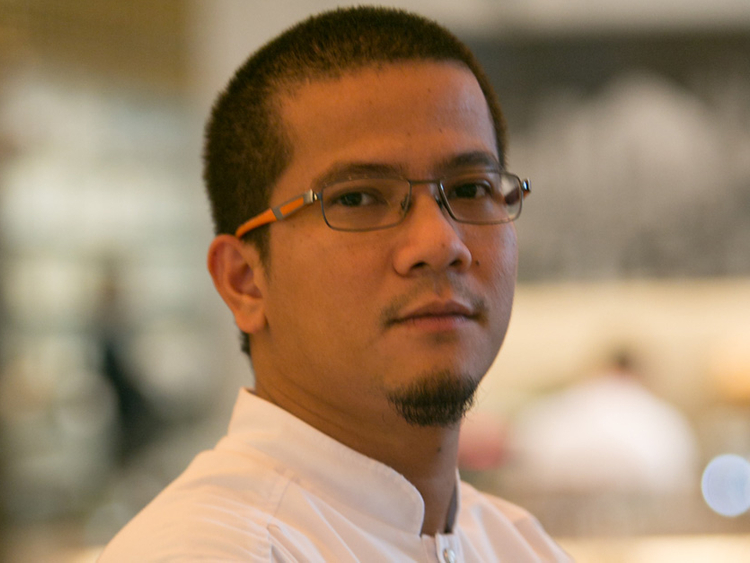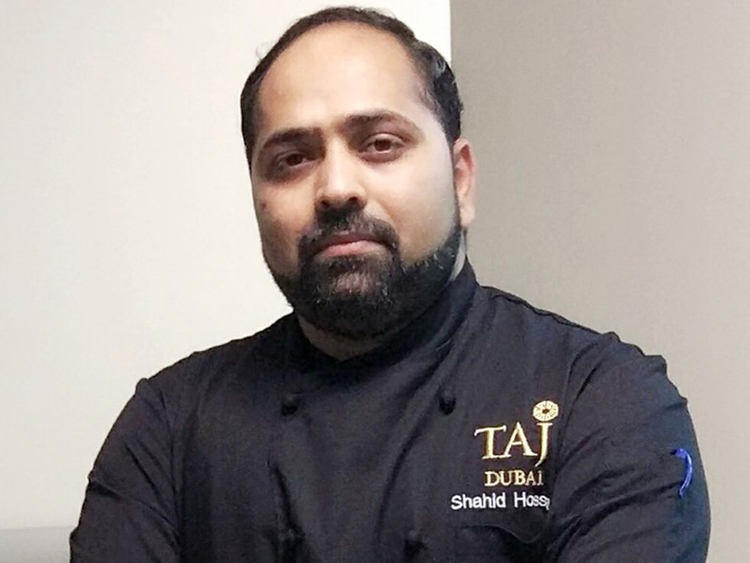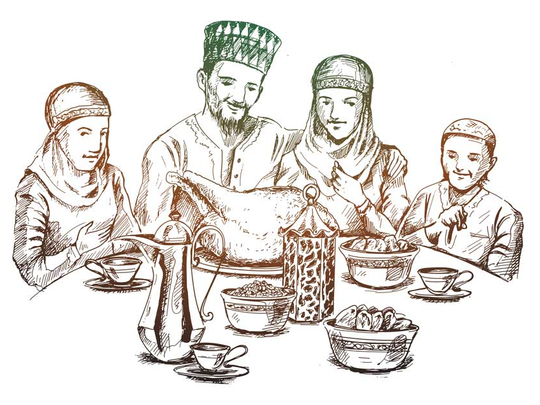
Mohammad Al Watban remembers his grandmother every Eid Al Fitr. The young Syrian Chef de Partie at the Fairmont
Fujairah Beach Resort talks of how she would make mlihi for the entire family. The chicken and bulgur recipe is eaten on Fridays and on special occasions in Daraa, his hometown in the south-west of the country.
“Every time I think of Eid Al Fitr, I think of my grandmother making a plethora of traditional Syrian dishes,” he tells GN Focus. “Mlihi in particular is a memory I will cherish for the rest of my life. In fact, every time I see bulgur at the market, I think of my siti (grandmother).”
He now c o o k s the dish, which he says his ancestors invented and is unique to his part of Syria, for his children at home, although only sporadically because it is so time-consuming — the ingredients are slow-cooked in a tightly sealed pot.
“Getting the bourghul to my siti’s mashed consistency is quite the labour-intensive task. But I definitely want my children to experience it, especially at Eid.” Mlihi graces the table alongside lamb ouzi and maa’louba, two Syrian classics now eaten across the region including here in the UAE, and which are on the menu at the hotel.
Eid Al Fitr marks the end of Ramadan, the Islamic month of fasting. All around the world, families and friends gather over the break to celebrate the successful completion of what can often be an arduous period. Food naturally takes centre stage, chefs from across the UAE tell GN Focus, sharing memories and traditions associated with the festival.
“I’ll never forget Eid when I was a young boy of 12,” says Reif Othman, the well-regarded Singaporean who is Chef and Partner at Sumosan&Twiga at Billionaire Mansion.
“We had everyone come to the house on the first day. It is very rare to have everyone visiting at the same time. We had uncles and aunties and cousins from Malaysia and Indonesia too. The celebration day is magical as my mum will storm up a variety of dishes. A feast fit for a king.”
Othman’s favourites are classic Malay dishes that the majority of Muslim homes in Singapore serve on the first day of Eid. Ayam masak merah is a semi-dry chicken dish cooked in tomato, chilli and candlenuts, whose rich, creamy taste finds its way into classic recipes across the Malay archipelago. Other traditional recipes are sayur lodeh, a vegetable and tofu stew made with dried shrimp paste and coconut milk, and ketupat, rice cooked in a pouch woven from young palm leaves. “Almost every Muslim home in Singapore will serve these on the first day. My mum serves the best ones,” says Othman.
Living so far away from home can be difficult at festivals such as Eid, he says, but like many expats, his friends double up as family, although he has recently been joined by his wife and children. “Living in Dubai you tend to make your own family,” he says. “With my Muslim colleagues, we started a tradition, hosting a pot
luck at least once during Ramadan and on the first day of Eid.”
“Everyone gathers at my house. This is a joyous and relaxing time for us as we get together to eat and enjoy our day together. This is my family now; and many consider me as their big brother outside the kitchen to lend an ear or offer advice.”
Muhamar Noer Abdi, the Indonesian head chef at Intersect by Lexus, finds that festive spirit at his consulate in Dubai, where his compatriots get together to pray and celebrate. “So it’s kind of a gathering day for Indonesians in Dubai, but everyone is welcome, not just Indonesians,” he says.
“You can bring your friends and family; even non-Muslims can come to eat and gather.” Abdi always looks forward to lemang, glutinous rice cooked with coconut milk, pandan leaves and salt in a hollowed-out bamboo stick lined over a wood fire, and served with beef rendang.
“We only cook this once a year, the night before Eid Al Fitr, to eat the next day,” he says. “It’s a gathering for the entire family, we talk and cook lemang over a bonfire. It’s special.” Sometimes, the family may cook gulai nurung kerah, or smoked catfish curry with green eggplant.
“If someone’s visiting us after a long time, we will cook it as a way of welcome.” None of the dishes are on his restaurant’s menu, except rendang, which he serves with lamb instead of beef.
Lamb shows up at Eid tables across India in the form of biryani, says Mohammad Shahid Hossain, Executive Sous Chef at the Taj Dubai, who celebrates Eid Al Fitr with his cousins and friends in the UAE.
At his home, biryani is always made with meetha ittar, a sweet-smelling mix of essential oils, and potatoes.
In many parts of the world, Eid Al Fitr is often called the Sweet Eid, because of the sheer amount of celebratory desserts cooked and served over the holiday. In India, a milky pudding of roasted vermicelli and dry fruits dates has been indispensable at Eid since Mughal times.
“Every house you go to during Eid, it’s the sheer kurma or sevai which come first, so at the end of the day, one has had enough of sheer kurma and would not wish to have any more,” Hossain says with a laugh. For him and other expats in the UAE, tradition has the sweetest taste at Eid.


